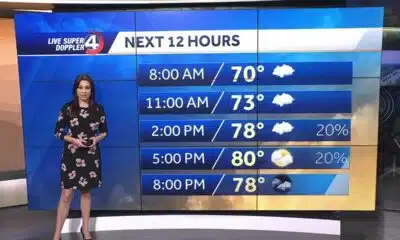News from the South - North Carolina News Feed
Library system split in NC over LGBTQ+ content could face lawsuit
With less than two weeks before Yancey County officially exits its regional public library system, opponents to the change are making a last-ditch legal effort to force the county to reverse course. The two-year-long debate over the future of the library in Burnsville began with residents’ complaints over a Pride Month display in 2023.
Resident and local Democratic leader Landon Beaver started a crowdfunding campaign last month which has raised more than $48,000 to date, enough to pay the retainer fees of North Carolina law firm Brooks Pierce.
Beaver told Carolina Public Press his goal is to file a First Amendment lawsuit against the county and secure an emergency hearing for an injunction on the library transition, which is set to happen July 1.
[Subscribe for FREE to Carolina Public Press’ alerts and weekend roundup newsletters]
Collins Saint, an attorney for Brooks Pierce specializing in education law and civil rights litigation, confirmed that the firm was representing Beaver, but that no lawsuit had been filed as of Wednesday. Beaver called the state of things a “developing legal situation,” but remained optimistic that there remained enough time to file a lawsuit and pause the library transition before the end of the month.
Meanwhile, Yancey County and the regional library system — both of which have been preparing for the transition over the past year — told CPP that they have little reason to think the exit won’t happen as planned.
“We haven’t had any discussions on that,” Yancey County Manager Lynn Austin said of the potential lawsuit. “We’re just looking to move forward (on) July 1.”
Legal fight to save library system looms
County commissioners first announced their intent to leave the Avery-Mitchell-Yancey Regional Library last June.
That decision followed a tumultuous year in which Yancey overhauled the public advisory board for its library branch, which included the appointment of residents who decried books featuring LGBTQ+ characters and themes as inappropriate for children.
Since then, Yancey has charged ahead with its planned exit by applying for state grants and hiring replacements for the current Yancey library staff, all of whom are employees of the regional library system.
Residents opposed to the change fear that they will be paying more in taxes for lessened services. They stand to lose regional system benefits such as its children’s librarian and digital literacy program.
They’ve organized “solidarity walks” and shown up at commissioners’ meetings urging them to reconsider the exit. Still, the county has remained steadfast in its desire for greater freedom over library operations.
“(A lawsuit) was the absolute last resort,” Beaver said. “Hence the marches and the speaking last year, trying to get the commissioners to see that this was not in the best interest of the community and not the best use of financial resources.”

Beaver took part in many of those community organizing efforts over the past year. In April he was elected chair of the Yancey County Democrats, the minority party in a largely conservative county. All five Yancey County commissioners are Republicans.
Beaver criticized board chairman Jeff Whitson’s stated vision of an “unbiased library” as a justification for limiting freedom of expression and breaking with the regional library system.
“To say that we won’t have any displays, we won’t have anything divisive in the library, that’s just going to start looking like an echo chamber to a certain set of people,” Beaver said.
“That’s not what a library is, and that’s not how the First Amendment works.”
Local debates capture national attention
The heated debate in Yancey is just one more example of a larger national trend: the transformation of public schools and libraries into political battlefields.
John Chrastka is executive director at EveryLibrary, a self-described “non-partisan, pro-library” political advocacy organization. He told CPP that the emergence of social conservative groups seeking to limit materials in public libraries has led to policy changes at both the state and local level. Sometimes, he said, the best means of pushing back is through the courts.
“Sometimes (court) is the only place that you can go, because you can organize all day long locally and the politicians and the political actors won’t listen because they’re not in for the rule of law,” Chrastka said.
First Amendment challenges are common in these library disputes, but Chrastka said an often underlooked litigation strategy is through a civil rights lens.
Federal law dictates that all people are entitled to “equal enjoyment of the goods, services, facilities, privileges, advantages and accommodations of any place of public accommodation.” Public libraries, being taxpayer-funded institutions, are considered places of public accommodation.
“So many of the book bans, so many of the challenges to displays, so many fights over what kind of programming is done in the libraries is based on the comfort of the majority,” Chrastka said.
“If the majority population isn’t comfortable with a minority population — whether it’s race or gender or sexuality or religion, we see these fights. The relevance of a program, the relevance of a display, the relevance of a title to a minority population should be considered in that civil rights framework.”
Uncharted territory for library system
What might happen if Yancey County does not exit its regional library system on July 1, by judicial order or otherwise, is an untested question.
Earlier this month the county approved its budget for the upcoming fiscal year, which included more than $300,000 for the library. It already hired three full-time employees to replace the outgoing regional employees.
The regional system, too, has transition plans in place. It will change its name to the Toe River Valley Regional Library, and a new interlocal agreement was drafted by Avery County, Mitchell County and the Town of Spruce Pine earlier this year.
Current regional director Amber Westall Briggs told CPP that she doesn’t expect the transition to be nixed given the work done on both sides to make it happen, although it is a possibility that she’s discussed with her staff.
“If (Yancey) did not withdraw and they changed their mind, I would imagine we would go on as we normally would,” Briggs added.
That would leave Yancey with the problem of figuring out how to reverse course after already having passed a budget and hiring new employees.
“For patrons, it would be the least disruptive (outcome),” Beaver said of a possible injunction on the library transition.
“For the finance officers, it would probably be the most disruptive.”
This article first appeared on Carolina Public Press and is republished here under a Creative Commons Attribution-NoDerivatives 4.0 International License.
The post Library system split in NC over LGBTQ+ content could face lawsuit appeared first on carolinapublicpress.org
Note: The following A.I. based commentary is not part of the original article, reproduced above, but is offered in the hopes that it will promote greater media literacy and critical thinking, by making any potential bias more visible to the reader –Staff Editor.
Political Bias Rating: Center-Left
The article presents a factual recount of the local dispute surrounding Yancey County’s exit from its regional library system, highlighting the perspectives of opponents, particularly those advocating against the removal due to concerns over LGBTQ+ content censorship and library access. The language is generally neutral but shows subtle sympathy toward the opponents’ viewpoint by emphasizing civil rights, First Amendment arguments, and the impact on marginalized groups. The coverage includes voices from Democratic local leaders and pro-library advocates, while framing the county commissioners as conservative and steadfast, which suggests a slight lean toward supporting progressive positions on inclusivity and free expression in public institutions.
News from the South - North Carolina News Feed
Body of missing NC teen found in Florida, family says
SUMMARY: The body of missing North Carolina teen Gio Gio was found in Bradenton, Florida, confirmed by his family. Originally, Gio Gio was supposed to be picked up by relatives after meeting cousins in Florida, but he disappeared after texting his mother for help. His family’s private investigators, not the police, discovered his body near I-75 after police had initially searched the area. Gio Gio’s mother expressed her heartbreak on Facebook, calling it every parent’s worst nightmare. The investigation continues, focusing on the timeline after Gio Gio entered the car with his cousins. An autopsy is pending, with no immediate signs of foul play.
The body of Giovanni Pelletier was found in a retention pond, authorities said, and his mom is living “every parent’s worst nightmare.”
https://abc11.com/post/giovanni-pelletier-body-missing-18-year-old-north-carolina-found-pond-where-last-seen-family-says/17483056/
Download: https://abc11.com/apps/
Like us on Facebook: https://www.facebook.com/ABC11/
Instagram: https://www.instagram.com/abc11_wtvd/
Threads: https://www.threads.net/@abc11_wtvd
TIKTOK: https://www.tiktok.com/@abc11_eyewitnessnews
X: https://x.com/ABC11_WTVD
News from the South - North Carolina News Feed
‘Highballed’: Data shows tax assessment inequalities affecting longtime homeowners
SUMMARY: Longtime homeowners in historically Black neighborhoods like Hillsborough face disproportionate property tax burdens compared to wealthier, mostly white areas nearby. Beverly Walton, a 66-year resident of Renshaw Street, inherited her home but struggles to afford rising taxes despite no renovations. Her house, valued lower than newer homes, is taxed at a higher rate, leading to financial strain on fixed incomes. Data from Wake, Durham, and Orange counties reveal majority nonwhite neighborhoods pay about $9 more per $100,000 in home value, despite lower average home prices. Advocates call for fairer assessments to prevent pricing out longtime residents amid regional growth.
Data shows tax assessment inequalities affecting longtime homeowners
https://abc11.com/post/highballed-data-shows-tax-assessment-inequalities-affecting-longtime-homeowners/17473973/
Download: https://abc11.com/apps/
Like us on Facebook: https://www.facebook.com/ABC11/
Instagram: https://www.instagram.com/abc11_wtvd/
Threads: https://www.threads.net/@abc11_wtvd
TIKTOK: https://www.tiktok.com/@abc11_eyewitnessnews
News from the South - North Carolina News Feed
Two deaths, sinkholes, downed trees: The impacts of severe flooding in Triangle
SUMMARY: Severe flooding in the Triangle region has caused two deaths, sinkholes, and downed trees. In Nash County, 55-year-old Raymond Evans Jr. and 24-year-old Lahie Alustin died after their minivan was swept into a ravine. Evans heroically tried to save Alustin after police efforts failed. A memorial has grown at the site. In Apex, heavy rain caused a sinkhole on Olive Chapel Road, collapsing a section already slated for repairs. Town officials are working with the Department of Transportation to expedite repairs, possibly earlier than the initially expected November timeline. Residents face detours and ongoing disruptions.
WRAL is tracking the impact of severe flooding that occurred all through Wednesday. Rain will continue on-and-off on Thursday, and it could be heavy at times.
-
Mississippi Today6 days ago
After 30 years in prison, Mississippi woman dies from cancer she says was preventable
-
News from the South - Texas News Feed6 days ago
Texas redistricting: What to know about Dems’ quorum break
-
News from the South - North Carolina News Feed4 days ago
Two people unaccounted for in Spring Lake after flash flooding
-
News from the South - Florida News Feed7 days ago
Warning for social media shoppers after $22K RV scam
-
News from the South - Georgia News Feed7 days ago
Georgia lawmakers to return this winter to Capitol chambers refreshed with 19th Century details
-
News from the South - Texas News Feed7 days ago
Pritzker says Texas Democrats who fled state will be protected amid arrest threats
-
Mississippi Today5 days ago
Brain drain: Mother understands her daughters’ decisions to leave Mississippi
-
News from the South - Arkansas News Feed7 days ago
Op-Ed: U.S. District Court rightfully blocked Arkansas’ PBM ban | Opinion









































